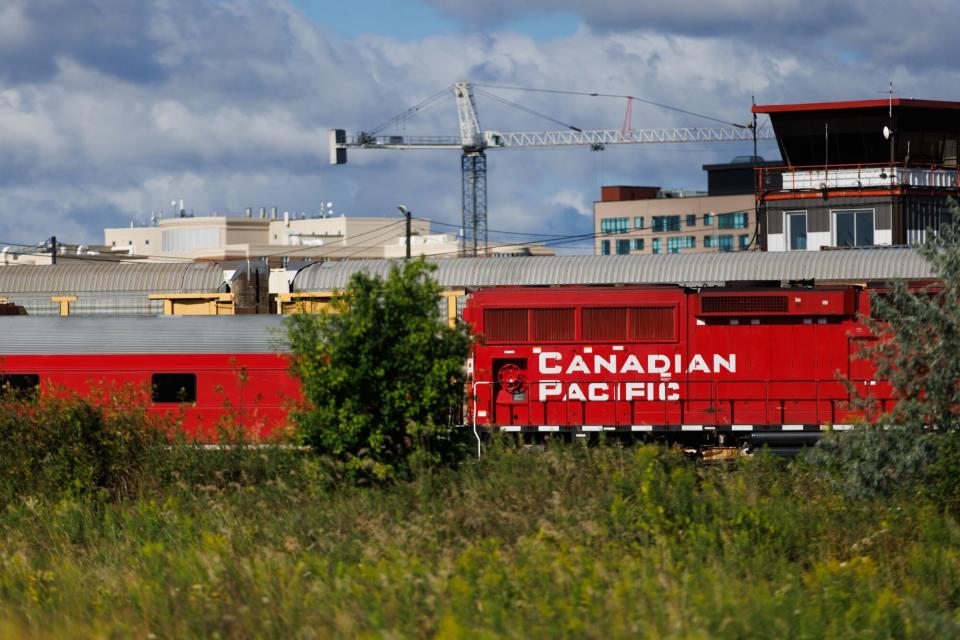US Shippers Brace for Port Strain as Canada Railways Shut Down
(Bloomberg) --
Most Read from Bloomberg
Chicago's Migrant Surge Is Stirring Trouble for Democrats in DNC Host City
UK Transport Minister Clears Path for More 20mph Speed Zones
With Self-Driving Vans, Hamburg Tries to Make Microtransit Work
Importers and exporters are left with few options as a near-total rail shutdown in Canada risks delaying ocean shipments, spiking freight costs and straining the busiest US ports, which are already handling a cargo surge.
Canadian National Railway Co. and Canadian Pacific Kansas City Ltd. locked out more than than 9,000 Teamsters Canada Rail Conference workers after a 12:01 a.m. New York time deadline elapsed on Thursday. The union had issued a strike notice against Canadian Pacific that took effect at the same time.
The impacts are already occurring. C.H. Robinson Worldwide, Inc. has been diverting much of its US customers’ ocean cargo away from Canadian ports to terminals in Southern California and Washington State, while retail customers are switching to trucks for time-sensitive goods, said Scott Shannon, the freight forwarding firm’s vice president for Canada.
The dispute has begun to affect the movement of products including wheat, chemicals and fertilizers. The two railways started a phased shutdown of the network last week to ensure that hazardous goods aren’t stuck in places they shouldn’t be.
Shannon explained that US trains, in turn, began shutting down ahead of the deadline. “Railroads are like an outdoor conveyor belt that never stops running. They’re designed to operate 24/7, not stop and start, so they can’t just flip a switch at midnight,” he said in a statement. “They need to be finished shutting down at midnight.”
Alternative routes have their own uncertainty baked in. A union of 730 dock foremen in British Columbia — home to Canada’s busiest port in Vancouver — are also threatening to strike, pending a vote by the International Longshore & Warehouse Union Local 514.
Some logistics companies, including C.H. Robinson, are concerned that dockworker unions on the US west coast may refuse to unload cargo originally bound for Canada if the BC longshore foremen elect to go out on strike, too.
“In the case of a strike, allied port workers along the US west coast aren’t likely to handle Canadian freight no matter how it arrives,” Shannon said, adding that this situation unfolded during a 13-day strike at the Vancouver port last year. “Containers were in limbo for two weeks.”
The ILWU’s main office in San Francisco and ILWU Local 514 declined to comment.
The labor issues in Canada are also coinciding with contract talks covering about 45,000 dockworkers at every major port from Houston to Boston. The International Longshoremen Association called off wage negotiations earlier this summer and are preparing to strike if no deal is reached before the Sept. 30 expiration.
As a result, some cargo has been rerouted to ports on the US west coast, which are already dealing with container volumes approaching pandemic records.
Marine transport companies have plenty of other reasons to hesitate to divert ships, including longer distances, the possibility of congestion and different tariffs.
For cargo already loaded on vessels, direct discharge at Canadian ports remains the most viable option at this time due to regulatory constraints among neighboring countries, said a spokesperson for Yang Ming Marine Transport Corp.
The costs of redirecting cargo will add up for importers and exporters, with surcharges from marine transporters and the additional expense of switching to trucks.
“These companies are managing congestion at US ports and ensuring there’s enough capacity to handle the additional traffic being diverted, particularly since Canadian ports serve as crucial gateways for US-bound cargo,” Richard Patry, managing director of DHL Global Forwarding Canada, said in an email.
There are indications that shippers started to divert cargo away from Canada after rail workers initially voted in favor of a strike in May.
The Centerm terminal at the Vancouver port has seen a roughly 12% decline in the annual expected volume since then, a spokesperson for logistics giant DP World, which operates the site, confirmed by email.
The stoppage of Canada’s two largest railways at the same time will impose significant impacts to the American economy, the US Chamber of Commerce has said.
Most Americans have “no idea” how dependent the country is on Canadian railroads, said Peter Friedmann, executive director of the Agriculture Transportation Coalition, in a post on LinkedIn earlier this week. Even though alternate routes exist, US railroads and marine terminals have limited capacity.
Congestion is even now “rearing its disruptive and costly head,” he wrote.
--With assistance from Thomas Seal.
(Recasts to reflect strike underway. An earlier version removed a map that contained incorrect railway names.)
Most Read from Bloomberg Businessweek
‘I’m So Scared’: NFL Players on How Betting Changes the Sport
Covid Hobbled a Profitable Bond Trade. High Interest Rates Are Reviving It
©2024 Bloomberg L.P.










